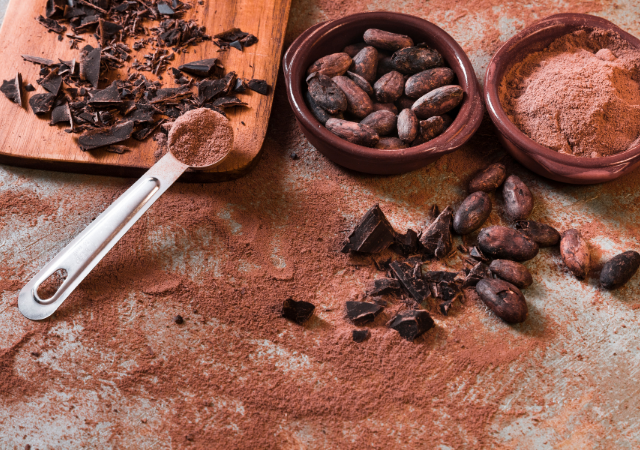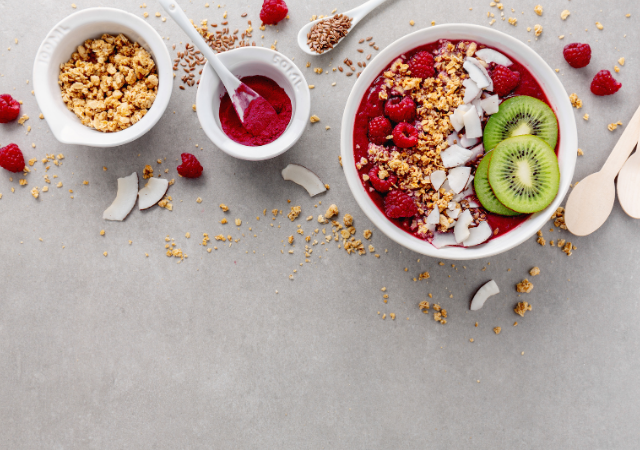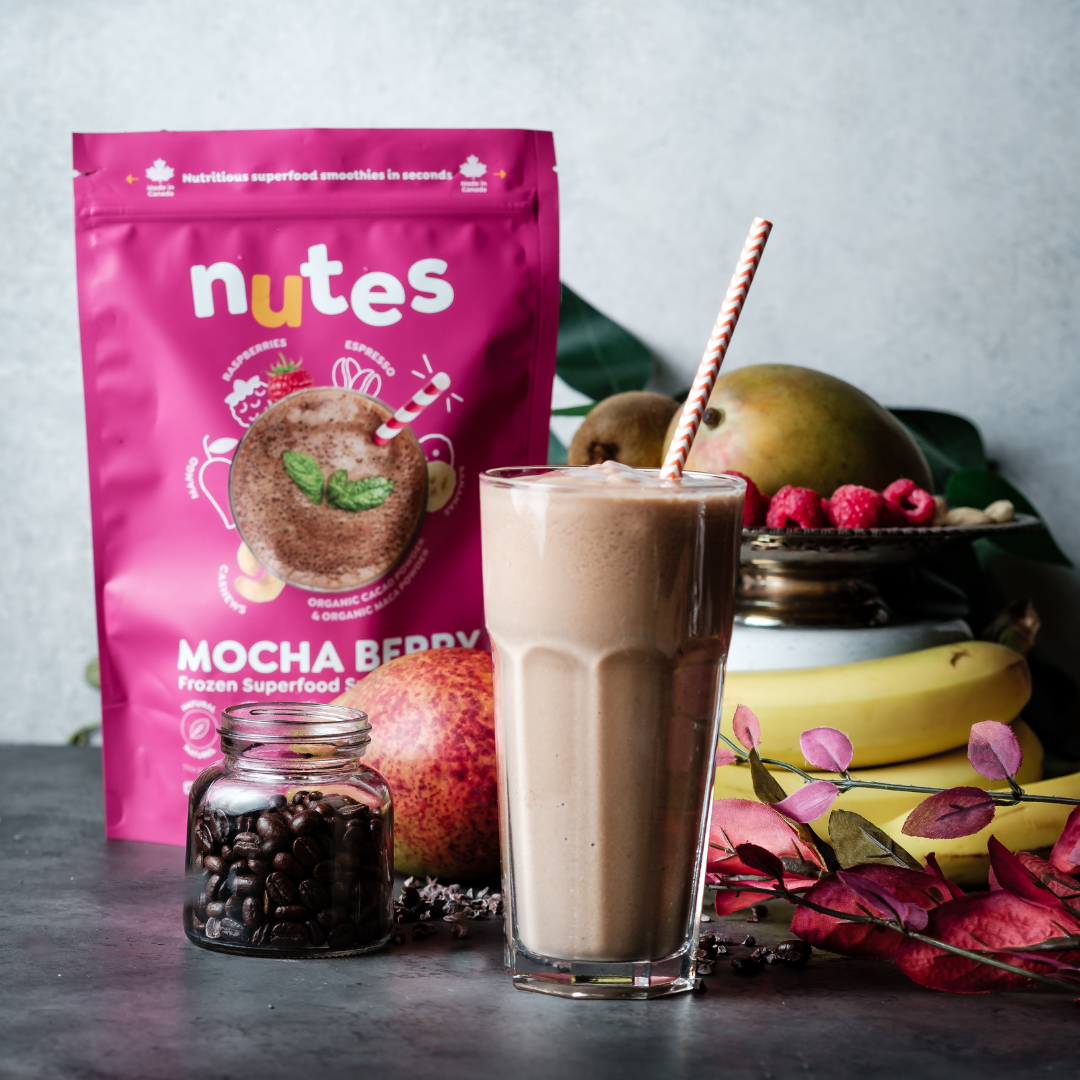Cacao Health Benefits: 7 Powerful Secrets to Be Healthier Today

Cacao powder and chocolate are classic indulgence foods. You probably love chocolate and cacao in your morning drinks, desserts, and even your smoothies. But did you know it’s also one of the most potent foods from nature?
The plant’s official name, TheoBroma Cacao, means “food of the gods” after all.
Cacao has more antioxidant content than known power fruits like blueberry, pomegranate, and acai berry. That means that your pure chocolate drink and dark chocolate bars are far more beneficial to your health than you think.
And, there’s more!
You should consider cacao products if you want to improve your complexion, gain mental clarity, or increase your energy.
But wait! Don’t rush to stock up on your favourite chocolate bars just yet.
Like any food with health benefits, there are right and wrong ways to eat and drink cacao. There are key things you need to consider to make the most of cacao’s health benefits.
Is Cacao a Superfood?
Cacao is listed as a superfood, which is any food that is rich in natural compounds beneficial to our health. According to The US Department of Agriculture Food Data Central, a 100 g portion of unsweetened cocoa powder includes the following nutrients:

But not all cacao products are healthy.
According to studies, raw cacao and natural cocoa have greater antioxidant levels than other fruits. But alkalized cocoa unfortunately doesn’t have as many nutrients as natural cocoa or raw cacao.
Alkalized or Dutched cocoas are chocolates and cocoa products treated with alkalizing agents. Modern ice cream, common hot cocoa drinks, milk chocolates, and baked chocolate desserts usually use Dutched cocoa. It has a smooth flavour and mild taste, but it loses much of its nutrient content in the process. Sugar and other additives also make it an energy-dense food that could result in weight gain.
Natural cocoa and raw cacao don't go through alkalization. They are processed using the Broma method, which uses roasting and dripping to extract cocoa butter from cacao beans. Compared to alkalized cocoa, natural cocoa retains more of its antioxidants and nutrients.
Raw cacao, such as cacao nibs, don’t undergo roasting or alkalizing processes. This means that they keep most of their nutrients and are even healthier than natural cocoa.
If you want to make the most of the benefits of cacao, then choose cacao products made from raw or at least 70% natural cocoa.
Cacao Health Benefits
Protects from Free radicals and Inflammation
Phenolic antioxidants in cacao hunt and destroy free radicals in the body. They also improve your absorption of important minerals like iron and copper.
Flavonoids, which are also in natural cacao products, inhibit enzymes that weaken your body’s defenses. These protective actions strengthen the body's capacity to fend off health hazards.
Researchers also correlate eating dark chocolates with lower levels of C-reactive proteins. These proteins are our blood's markers for inflammation. Too much inflammation could trigger diseases like asthma, arthritis, cancer, and diabetes. Lowered C-reactive proteins show that dark chocolates help keep body inflammation at healthy levels.
Improves Vein and Heart Health
The state of your veins and arteries have an impact on the health of your heart.
As you age, your blood vessels become stiffer and become less able to allow proper blood flow. As a result, you become more prone to hypertension.
The epicatechin, a flavonoid found in cacao, helps prevent the condition by improving the elasticity of the blood vessel walls.
Various studies on middle-aged and elderly men came to this same conclusion. They also found that flavonoid-rich drinks help lower bad cholesterol and increase good ones. Regular intake of cacao flavonoids lowers the long-term risks of heart disease by 22%. It also lowers the risks of heart attack by 31%.
Protects from Diabetes
Researchers also have evidence suggesting that cacao antioxidants reduce your resistance to insulin.
In a Japanese study, men who consumed chocolate snack pieces once every week showed a 35% reduction of risk for diabetes. A lower but similar reduction was also noted among women.
Relaxes Muscles and Increases Energy
Dark chocolates made of at least 70% cacao contain 36 mg magnesium per 100 kcal serving. Magnesium helps rid your muscles of lactate, which causes fatigue. The essential mineral also aids in converting food to energy, creating new proteins and regulating your nervous system.
Prevents Copper Deficiency
Dark chocolate and cacao powder can provide up to 31% of the recommended daily intake of copper. The mineral is essential for increasing iron absorption, maintaining bone strength, improving metabolism, and ensuring a healthy immune system.
Copper also aids your body in developing the brain and forming new red blood cells. Red blood cells are important for carrying oxygen to different body parts and moving toxins out.
Protects the Skin and Enhances Complexion
When applied topically, raw cacao also has excellent benefits for your skin. It can protect you from UV radiation damage and oxidative stress. Its anti-inflammatory properties soothe blemishes and redness. Antioxidants in cacao also repair skin damage caused by aging, which can shave a few years off your looks.
Promotes Mental Clarity
Cacao and raw chocolate can boost memory and reaction time in the short-term. Elderlies who take cacao supplements in the long-term also show better memory than their peers. This is why cacao is often linked with the prevention of dementia. The food also promotes mental clarity by preventing loneliness and depression.
Should You Eat and Drink Cacao Every day?
Given all the health benefits, how much cacao should you eat per day? Or is it even okay to drink cacao every day?
In everything, moderation is key. This includes cacao consumption.
In different studies, they found that the daily intake of dark chocolate should be 20 g or less. Going over that dosage could affect your heart rhythm and blood pressure.
Also, be sensitive to cues from your body. Watch out for tell-tale signs of cacao overdose. Common symptoms are insomnia, nervousness, migraine, constipation, and rapid heartbeat.
But, according to researchers, the feared raw cacao dangers, like cacao powder causing cancer, are not backed by scientific evidence.
Cacao side-effects are also outweighed by its benefits.
But as with other nutrient-dense food, eating cacao and its products is best when you first consult with a nutritionist.
When you know what dose is appropriate for you, you can safely take advantage of cacao health benefits in your daily diet.
Food photo created by freepik




Comments